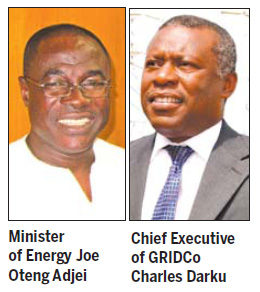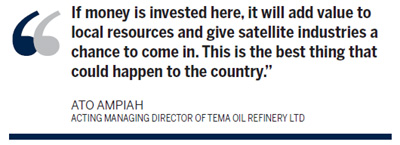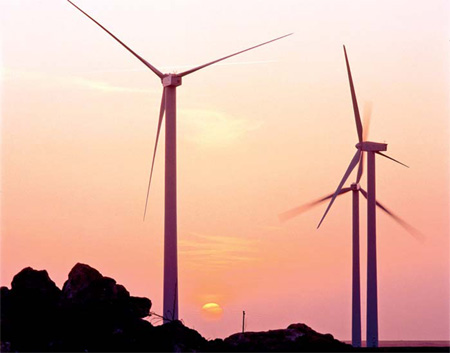News
Ghana to use energy to fuel development
(China Daily)
Updated: 2010-10-26 07:57
 |
Large Medium Small |
|
Renewable energies look set to become a feature of Ghana's energy landscape. Provided to China Daily |

A nation of 'prime movers' powers up for future success
Ghana's new oil fortunes will go a long way in helping the country achieve its goal of middle-income status by 2015.
Ever since commercial oil was officially discovered in 2007, Ghana's various political parties pledged to use revenues from this precious resource to develop priority sectors, such as infrastructure, agriculture, food processing, Information and Communications Technologies (ICT), education, health, rural development, housing, water and sanitation.
As President Atta Mills announced in his budget statement this year, "the oil and gas reserves will serve as a catalyst for the commercial exploitation of our other natural resources that have either not been exploited, or are exploited but not processed into high-value products for domestic use and exports.
"The gas resources will be used to support energy-based industries, such as glass bottles, steel mills, aluminium smelting and rolling mill operations that have faced serious challenges from the high cost and irregular power supply."
He announced government plans to exploit the sea salt, iron ore, bauxite, limestone and silica sand potential in the country once the energy supply and value-added constraints are dealt with, using gas as the main source of energy.
China's help will be invaluable in getting such projects off the ground. By day three of the president's official visit to China, the host country had injected almost $14 billion into the Ghanaian economy, $3 billion of which was slated for the energy sector exclusively.
Ghana Minister of Energy, the England- and Canada-educated Joe Oteng Adjei said: "The Chinese have already been involved in our energy sector; they are building the Bui Dam, and given specific grants through the China Water Company. Our policy is that all investors will be welcome, provided they comply and respect our laws. We had the gold, and people did not benefit. We had demand for cocoa, and the people did not benefit. The same for timber. Now we have oil, the people have to benefitjob creation and transparency will be fundamental.
"At the moment, we don't have the experience or the wealth of knowledge. But Ghana is a fast country. Local content, local participation, the use of local goods and services and ultimately job creation are very important to us in this sector. As for the environment, if I destroy it, I hurt the heritage for my children and my grandchildren. So we are committed to saving it."
Addressing investors, the minister said: "When you come to Ghana, don't use our start ups, because we have never produced oil before. Use the same technology they use in the Gulf of Mexico. We will all work together to create a basic framework that both investors and government will feel comfortable with."
Such foresight has led the government, through the Ghana National Petroleum Corporation, to secure 10 percent of any international petroleum agreement entered into.
On an upward swing
As the government plans to reach 85 percent electricity penetration over the next five years and increase power production to 5,000 megawatts, Ghana's energy companies are powering up for growth.
The entity responsible for the transmission of electricity in Ghana, particularly in the northern region of the country, Ghana Grid Company Ltd (GRIDCo) is taking pioneering steps toward the reform and evolution of the power sector in Ghana and the sub-region and sees itself as central to economic development efforts.
The dynamic firm, run by chief executive Charles Darku, has started transmitting electricity through the West Africa Power Pool (WAPP). The project, jointly funded by the Kuwait Fund, European Bank, and the international development arm of the World Bank, will connect to the West African Transmission Grid.
"The WAPP is intended to transform the power supply arrangements in West Africa into one big regional market through the construction of a number of high voltage interconnections to link each of the separate national grids," Darku, who was educated at Harvard and previously worked at the Volta River Authority, said.
"We in Ghana see ourselves as prime movers because we believe we have a grid that is sufficiently mature and a staff group that has done this for a long time. We can spiral our network into neighboring countries in a manner in which we can: first, support the government's desire to be a net exporter of electricity, but more importantly; second improve the lives of the people in those regions of West Africa. We need to create a critical mass of middle-class income consumption to boost their economies."
The company, which was incorporated in December 2006, and has developed two master plans, for transmission and generation respectively, to achieve its ambitious goals; namely to hit the government's targets, applauds China's bold efforts in the energy sector.
"This effort makes it much easier for other developers to come in now. And we are anxious that they come in because we cannot turn back on these initiatives."
GRIDCo has also pledged support for Ghana's renewable energies industry, as the government puts together a framework for investors in this field.
"Ghana has ample sunshine, so solar energy is a given. Wind and biomass are also fuel sources that can be used to generate electricity and we are actively looking into how we can bring that mix into the generation stock so that we keep up with the technology and don't get left behind in terms of where the world is going. We are more than ready to welcome Chinese developers in that area.
"There is a lot of room for investors, because we want to achieve double-digit growth and transform the size of the middle class. The opportunity is right there in all sectors of the economy, but it is absolutely clear that without energy to drive industry and drive businesses, nothing is going to happen."
Giant diversifies
The Volta River Authority (VRA) is also an extremely important part of the country's energy profile.
Established in 1962, it operates a total installed electricity generation capacity of 1,730 megawatts, made up from two hydroelectric plants on the Volta River, at two generating stations, which contribute 1,020 megawatts and 160 megawatts respectively, and a 330 megawatts combined-cycle thermal plant near Takoradi.
A further 220 megawatts thermal plant, Takoradi International Company (TICO), is owned as a joint venture with TAQA from Abu Dhabi in the United Arab Emirates. It is currently being converted into a 330 megawatts combined-cycle plant, which will bring the installed thermal generation capacity at Takoradi to 660 megawatts.
VRA's chief executive, Kweku Awotwi, said: "We produce around 90 percent of the country's energy requirements at present. We have a huge requirement for gas and generate more power than we have gas for. VRA is therefore looking very hard for more gas to fire its thermal power stations. It is cheaper than crude and a lot less volatile in terms of price. It is also better for the environment.
"It has been agreed that VRA, in partnership with a private developer, will be the anchor for the first phase of gas coming from Ghana. In terms of the Jubilee Oil Fields, the current projection is to have 120 million cubic feet (3.4 billion liters) a day of gas coming from it when it starts to produce oil. It will begin with 13 or 14 and rise up slowly.
"We have some gas turbines sitting in Tema and had planned to keep them there, but with Ghana gas now coming in, we are going to move them over to the Western region so that there will be minimal infrastructure required to bring the gas to us. They will sit right where the pipeline comes in from offshore, which means you would need about 60 million cubic feet on tap.
"From an investment point of view, if you don't have customers, you cannot develop. We have brought Nigerian gas into the country, and hopefully we will bring Ghanaian gas here"
The company, which exports electricity to Togo, Benin and Burkina Faso, is helping reduce the country's reliance on hydroelectricity. "We have gone from 100 percent ten years ago to 60 percent today, and it will be 50 percent within a couple of years.
"You have to have non-hydro sources to complement what you have already and thermal fired gas or oil pipe turbines produce that sort of capacity. We've got gas, so we should stick with gas. Then there's renewables. We have our plan to put in about 150 megawatts of renewables over the next three years; they are expensive, and 150 megawatts is a lot for a wind farm, but it is an important part of the energy mix that we would like to have."
At the Tema Oil Refinery (TOR) Ltd, its acting managing director Ato Ampiah is also delighted with China's commitment to Ghana's development, particulary a $3 billion agreement toward the development of the oil industry.
"It is clear that China coming in indicates a bond of determination and shows that it doesn't want Ghana to stay at those low rates," he said.
As commercial production gets under way, the TOR chief, who currently oversees production of 45,000 barrels per day (bpd), is in no doubt that the refinery should reposition itself for the export market.
"This sector is very capital intensive, which is why I am happy China is coming in," he said. "We are already talking to them about a memorandum of understanding in our expansion program. We believe that this refinery, which is responsible for between 9 and 10 percent of GDP, if well resourced, could become the engine for growth within the economy.
"If money is invested here, it will add value to local resources, and give satellite industries a chance to come in. This is the best thing that could happen to the country."
TOR, which has been operating in Ghana for more than 50 years, plans to build a second refinery, which is expected to increase production capacity to 120,000 bpd, and turn TOR into the hub of oil transactions in West Africa.

(China Daily 10/26/2010 page6)
